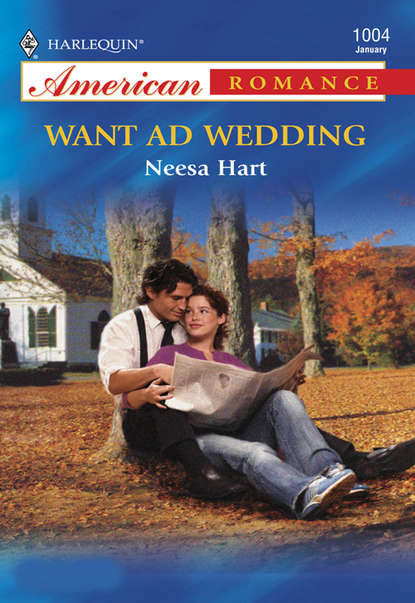По всем вопросам обращайтесь на: info@litportal.ru
(©) 2003-2025.
✖
Want Ad Wedding
Автор
Год написания книги
2018
Настройки чтения
Размер шрифта
Высота строк
Поля
Irritated, Molly gave him a sharp look. “You see? That’s exactly what I’m talking about. So what if the duck races aren’t the Indianapolis 500? The festival is the biggest event of the year in Payne. Even if you think it’s corny, you don’t have to be so smug.”
Sam shook his head, his expression rueful. “Molly—I was serious. How could I forget the duck races when you spent last week’s editorial meeting arguing with me about my plans for the coverage?”
She, too, remembered the heated meeting. Sam had decided to do away with the traditional coverage of the festival in favor of a background piece that explored the original vision of Howard Edgington, founder of the event and the primary endower of the scholarship program that encouraged Payne High School students to participate. “People are going to miss the recap,” Molly told him, now. “They look forward to it.”
“Then why don’t the last three years’ business stats show an increase in sales the Monday morning after?”
Irritated, Molly glared at him. “Despite what you might think, Sam, I’m probably the biggest proponent on staff of making changes to the Sentinel if that’s what it takes to save it.”
“Is that why you’ve been harassing me in meetings since the day I got here?” he drawled.
“I don’t harass,” she stated. At his dry look, she shook her head. “I don’t. I just argue.”
Sam laughed. “Point well taken.”
“And it might surprise you that I want to fix the problems, too, but I don’t think we have to do away with the Sentinel’s character to do that.”
“Neither do I,” he assured her.
“Then why are you giving me grief about the duck races coverage?”
“Your way won’t sell papers. My way will.”
Molly gritted her teeth. “Look, Sam, I’ll grant you that the festival is a little quirky. Fine, the duck races won’t stand up to Paul Revere Days in Boston. Maybe they won’t make the national registry of historic events, or get a write-up in Town & Country, but the duck races are ours.” She gave him a hard look. “And we like them, Sam. There’s nothing wrong with that.”
“I know.”
“The teenagers who compete in the scholarship contest work toward this all year—sometimes for longer than a year. They deserve better than a two-line mention in the community newspaper for their accomplishments.”
“Are you listening to yourself?” he asked.
“Yes. And that’s exactly my point. You can’t believe I feel this passionately about ducks.”
“Sure I can. You feel passionately about everything.” He paused. “Especially everything about Payne.”
She let that pass. “As hard as it may be for you to believe, there are some people in this world who enjoy the quaintness of things like duck races.”
“For your information, I happen to be one of those people.”
Molly thought she detected a slightly bitter note in his voice, but she pressed on. “You just don’t think they’re worthy of print coverage.”
“I think that when everyone in the town attends the festival, a recap isn’t going to sell any papers—except maybe to the family of the scholarship winner. But I also think there are enough new people in Payne that covering the history of the event and its founder is both relevant and marketable.”
“Maybe,” she conceded, “but the point isn’t about circulation—”
“It’s always about circulation,” Sam replied.
Molly rolled her eyes. “We’re talking about you and this town—not the paper. Whether or not your way will sell more papers doesn’t change the fact that you, yourself, said you’re having trouble getting people to accept you.”
He seemed to think that over. “And you believe it’s because I changed the coverage of the duck races?”
“No, Sam,” she said with strained patience. “I think it’s because you handed down your decision without even discussing it with the editorial staff.”
“You’re probably right,” he said. “I don’t have a lot of patience with the whining that goes on in those meetings. It’s mostly counterproductive.”
“I don’t think they consider their creative input whining,” she replied sharply.
“Yours isn’t,” he concurred. “You actually seem to have thought through your proposals before you field them.”
“Thanks.”
If Sam noticed her sarcasm, he didn’t comment. “But except for Daniel Constega, the rest of them just like to complain.”
Molly closed her eyes in frustration. “That’s exactly what I mean, Sam.”
“What?”
She looked at him again. “You can’t simply denigrate people’s work styles because they don’t happen to be the same as yours. Carl didn’t run the paper the way you do. The writers are used to having a lot of input.”
“Which is why,” he pointed out, “the Sentinel has covered the duck races the same way every year for a decade.”
“People like it. Traditions have their place.”
He hesitated. “You’re probably right.”
Surprised, Molly studied him through narrowed eyes. “Are you agreeing with me?”
“It looks like it.”
“My God. We might have to declare a municipal holiday.”
He regarded her with a definite sparkle in his gray eyes. “Maybe we could call it ‘Duck Day.”’
“Don’t start that again,” she said tartly, still chafing with remembered frustration at his apparent snobbery.
“I’m not belittling the ducks—or the teenagers who race them.”
“Just because they don’t win something prestigious like a scholarship to Harvard doesn’t mean they don’t work hard and accomplish something significant.”
“I agree.”
“A lot of teenagers don’t have the sense of responsibility or commitment to spend an entire year working toward something.”
“True.”
She glared at him. “What are you trying to pull, Sam?”
“Pull?”







